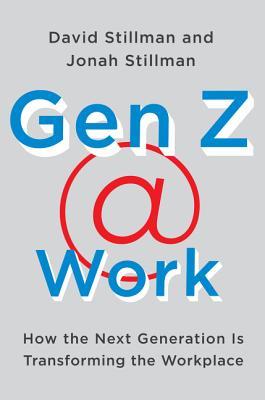Publication Date: March 21st, 2017
Rating: 2.5 Stars
The constant stream of books claiming to provide insight to specific generations leaves me feeling like I’m in the midst of an identity crisis. As this book defines generational markers, my family is often clashing with the “typical.” Raised by parents just on the cusp of being defined as baby boomers, I squeak into the Millennial generation while my brother slips neatly into the Gen Z population. As you can then imagine I found some aspects of this book intriguing while I other aspects have certainly been excessively played out.
Father and son team, David and Jonah Stillman, set out by defining the key traits of the “Gen Z” generation. On pages 10 to 12, the Stillmans define these key traits:
- Phigital – “born into a world where every physical aspect (people and places) has a digital equivalent.”
- Hyper-Custom – “ability to customize everything” creates “an expectation that there is intimate understanding of their behaviors and desires.”
- Realistic – Given the world events of their childhood, this generation has developed a “pragmatic mindset when it comes to planning and preparing for the future.”
- FOMO (Fear of Missing Out) – this generation stays “on top of all trends and competition.”
- Weconomists – “push to breakdown internal and external silos to leverage the collective in a new convenient and cost-effective way.”
- DIY (Do-It-Yourself) – Encouraged to be independent by parents, this generation “believes that they can do just about anything by themselves.”
- Driven – “participation is not a real award there are winners and losers.”
Each chapter spends a significant amount of time comparing each of these traits against other generations and ultimately offers no substantial solutions for bridging the gap of ALL generations represented in the workplace. In fact, it became clear the authors lacked solutions when the book continually referenced the Millennials’ need for participation trophies because their parents (the Boomers) raised them to feel they needed these, therefore shifting the very trait Boomers hate about Millennials right back on the Boomers. Blame shifting isn’t going to solve issues, but the point the authors attempted to make is the deep reflection on the roles, values and experiences at play by each generation of parent and the effects these parenting styles had on the generation as they combine in creating a work culture heavily influenced by each’s upbringing.
As a Millennial myself, that grew up with a Gen Z brother, I deeply related to the Driven trait. As stated on page 277 Gen Z has a desire to win, needs help balancing their competitive drive with being team players, need to be encouraged to admit mistakes and talk about them while also needing help keeping one foot on the brake petal to avoid going too fast and making mistakes. Managers should be coaching Gen Zers on when to take a step back, and how to slow down and allow ideas and information to percolate; Gen Zers want to keep moving forward quickly. Workplaces also need to offer this upcoming generation opportunities to learn and grow rapidly if they hope to avoid losing them, while being sure to offer a combination of private space and shared workspaces.
To break that down:
- Workspaces – the recent trend has been to create an “open workspace” that “offers collaboration and free flow of ideas.” As a person that prefers quiet when working, these open concept spaces terrify me and truthfully would turn me off to a workplace. As identified by research within Gen Z @ Work, it would appear I am not alone in this feeling.
- Slowing Down & Admitting Mistakes – The Gen Z generation grew up with a constant stream of knowledge and rapid technological advances. It should then come as no surprise that they may “get their bodies moving a bit faster than their feet” and need to be told to slow down, let information process before diving in. I think this goes for any generation in the workplace as we are constantly bombarded with the feeling of feeling behind, we need to remember to slow down to avoid mistakes and achieve accuracy and the success we so yearn.
- Opportunities to Grow & Learn – I can’t imagine any generation wants to sit in one position for 50 years with no opportunities for advancement, further knowledge or growth. The difference is that Millennials and Gen Zers aren’t afraid to leave when workplaces aren’t offering them what they need. Gen Z @ Work touched on the need to overcome the costly mistakes employers are making that causes them to lose employees to competitors with more avenues for career growth. Employers are being challenged to rethink job paths, titles and responsibilities to better retain generations that demand more engagement of their employer.
Regardless of the generation, the message is clear – employers cannot get complacent if they hope to facilitate the successful blending of multiple generations within their workplace. Whether you turn to Jonah & David Stillman in your journey to understand the generations or turn to another book, it would be clever to prepare yourself for the challenges that are certain to arise.

